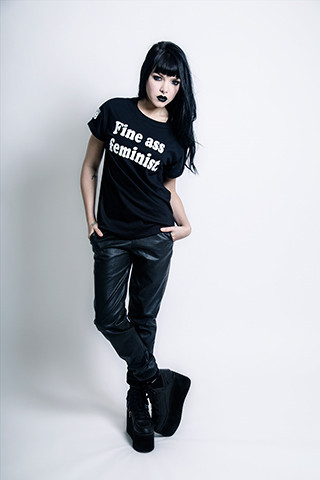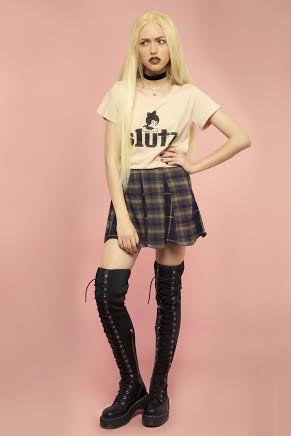Feminism has always been a controversial word that stirs up strong and polarizing reactions from men and women alike. Recently, this image has been propelled in an all-new direction from an unlikely source – fashion. Designers have employed slogans derived from the Riot Grrrl punk rock movement to create a whole new wave of feminist-inspired clothing.
New York City street-wear brand Married To The Mob (MTTM) has been making waves and causing controversy in the fashion industry by emblazoning their designs with slogans like “Fine Ass Feminist” or “Supreme Bitch.” Another local NYC brand, MadeMe, has garnered all sorts of media attention since Rihanna wore their now infamous “Slutz” shirt – a comedic play on the classic Utz potato chip logo.

These brands are just two of many that embrace feminism and put it on display. With that, feminist slogans are taking over fashion – from NYC street-wear brands to Los Angeles brand Dimepiece with their “Aint No Wifey” beanies and t-shirts that spread throughout Hollywood on celebrities, like Miley Cyrus and Cara Delevingne, all the way to popular chain stores like Urban Outfitters and Forever 21.
While feminist influenced designs are becoming increasingly popular, displaying words like slut and bitch is not a new concept for feminists. This trend harks back to the early 1990s, when feminists in Olympia, Washington, started the Riot Grrrl movement and began physically labeling themselves with these words in an attempt to re-appropriate them and make them less hurtful when used by male society. Brands like MTTM and MadeMe are picking up where the Riot Grrrls left off.
“My slutz shirt definitely creates a reaction,” says MadeMe Designer Erin Magee. “But the things that are most polarizing are often the most effective.”
By displaying these words on t-shirts and sweats, fashion is not only re-appropriating them, but also changing pre-conceived notions about feminism. Feminism has rarely been associated with shopping and femininity, but by popularizing these slogans, fashion is opening up feminism to a broader audience, and helping change its image.
“I think girls have been scared to call themselves feminists,” says designer Leah McSweeney from MTTM, “because in the past, in pop culture, a feminist has been deemed as a man-hating lesbian who looks butch and doesn’t care about looking cute, and that’s not really the case at all.”
Another concept popularized by the Riot Grrrl movement was propelled by the slogan “Every Girl is a Riot Grrrl” – meaning that every girl can be a feminist. Internal disagreements within the feminist movement, and the exclusivity of Riot Grrrl, left many girls feeling like they were not part of the team.
“Personally, I didn’t grow up listening to punk music,” McSweeney says. “I grew up listening to hip-hop and house music. I knew who Bikini Kill was, and I loved the movement, but I didn’t feel totally connected to it because Lil’ Kim was my Riot Grrrl.”
But now, more than ever, every girl can be a feminist.
“Even something as little as wearing a shirt that doesn’t fit with whatever they may be doing with their life,” says McSweeney, “makes [girls] feel empowered, because they still get to wear that t-shirt.”
Girls who never would have called themselves feminists before, are now wearing shirts that say “Fine Ass Feminist,” and girls who had no idea what feminism was, are at least thinking more about their own place in a misogynistic culture, even if they don’t know it. Professor Laura Jane Kenny, a former graduate student at Parsons who now teaches courses about feminism and fashion at the university, says she loves MTTM’s “Fine Ass Feminist” shirt because it’s changing the way men and women think about feminism.

“We have all these social and cultural connotations of feminists who are mean or who don’t like men,” she says. “The idea that you can have a feminist who is not those things, or even that you just hear [the word] more often is always positive because we become more familiar with dialoging it, and now probably more women are more comfortable addressing themselves as feminists.”
Like Riot Grrrls who started their movement as a response to the all male punk rock music scene, when Leah Mcsweeney decided to start her line, Married To The Mob, she wanted to create the first female street-wear brand and give a voice to girls in the male dominated skateboard community. She chose to use the famous skateboard/street-wear brand Supreme’s logo, and added the word bitch to it, poking fun at the often misogynistic views of skateboard culture. Leah inspired women in the skateboard community and started a trend that has since swept over the entire fashion scene. Brands like MTTM are no longer just for girls who skate, but for girls everywhere.
“Girls who buy my stuff are trying to make a statement and don’t really want to fit into the conventional part of society, and my clothes give them the chance to do that,” says McSweeney. “When is a woman called a bitch? When she says how she feels, when she demands something, when she knows what she wants from somebody.”
Social media has become an outlet for people to express their stand on issues facing modern feminism.
“Recently somebody called me a whore on twitter,” she recalls, “and said you can’t get mad when you say ‘sleep with whomever you want’ on a t-shirt. Obviously that person just didn’t understand the meaning behind that shirt, which is not ‘go sleep with everyone that exists.’ It’s more about not having to feel guilty about sleeping with who you want and the double standards that women have to deal with, and men not regarding their amount of sexual partners.”
Unlike previous methods to raise feminist awareness, fashion reaches a larger audience and is more inclusive. Girls who are fashion forward and up to date on current trends buy MTTM, as do girls who just want a comfortable t-shirt.
But critics worry that this fashion trend will come and go by next season, and that the young women who are buying these clothes are just jumping on the bandwagon. Whether or not that’s true, these brands are still encouraging women to think more critically about their role in society, and about feminism. The goal for designers like Leah McSweeney, Erin Magee, Ashley Jones and Laura Fama from Dimepiece, and even the designers using similar slogans at Urban Outfitters and Forever 21, is to introduce enough girls to feminism that the message will remain, even when the clothes go out of style.
“If nothing else, the positive is that it’s creating buzz and a desire to have conversations about what it means to be a slut, or a feminist, or being afraid of those words,” says Professor Laura Jane Kenny. “One person walking down the street with a shirt on that has edgy, controversial phrases isn’t as powerful as people talking about it afterwards. That’s where the growth really happens.”








Leave a Reply